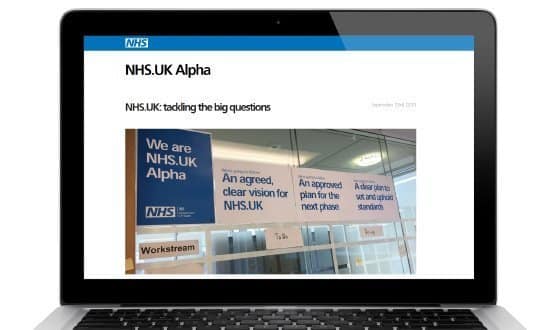NHS.uk: ‘digital hub’ plans progress

Plans for a new “digital hub” for health and care services are progressing with the creation of a specialist team to develop the NHS.uk website.
The NHS.uk Alpha team brings together expertise from NHS England, the Department of Health and NHS Choices, as well as people with digital experience in other fields.
The 12-week goal of the team is to pull together a detailed plan for how to develop the digital services offered through NHS.uk. The NHS.uk domain currently serves as the online home of NHS Choices, providing a range of medical advice and healthcare information.
The National Information Board’s 'Personalised Health and Care 2020' framework, published November 2014, sets out plans for the site to become a “single point of access” for citizens wanting to use an NHS service.
Beverley Bryant, NHS England’s director of digital technology, confirmed in June this year that NHS.uk would be developed to become a “clinically profiled directory of services encompassing health and social care services,” including a digital version of NHS 111, a health app library, the e-Referrals tool and the NHS Electronic Prescription Service.
Dr Marcus Baw, a freelance GP with an interest in IT, is clinical adviser for the Alpha project. He told Digital Health News he was “very impressed” with the way the development team was working to test user outputs and try to prove wrong their own assumptions on what someone might want from service.
“I’ve seen a lot of top down and very distant reorganisation in my years in the NHS and this seems to be the opposite of that. They are doing things really in a different way; they are keen to learn from mistakes and keen to take the best of the digital world’s working methods into redesigning NHS services.”
He mentioned the team had functioning prototypes of several services, including GP registration and appointment booking.
Baw explained that having these kind of services under one simple standard platform is beneficial as it means they don’t have to learn a new process if different practices are on different systems.
“There’s a real advantage here to get those common things people want to do and bring them into a usable web service. Do it once, do it well. And handle all the complexity [such as feeding data back to the GP system] in the background.”
Baw added that the overall aim of the NHS.uk is to create “activated, empowered patients” who can take an active interest in their healthcare.
At the end of the 12 weeks, Baw said he expects the team will have created several prototype templates for different services that can then go into further development in a ‘beta’ stage.
Baw’s personal ambition is for NHS.uk to be able to handle more complex issues, such as patient consent through an online dashboard where the public can give their permissions on who can have access to their data.
“It’s the only way to solve all these thorny problems about care.data and secondary uses of data and consent management and information governance.”
In a blog post Helen Rowntree, head of digital services at NHS England and joint product owner of NHS.uk Alpha says the team will “set a plan on standards and guidance to help other teams to build great digital services on NHS.UK."
She adds: “A 12 week project isn’t going to solve all the digital delivery challenges facing the health and care system. This is about setting a clear vision for NHS.UK, with prototypes that demonstrate the opportunities and a plan that gets us to the next stage.”




